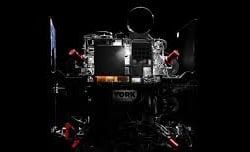ABOUT ROCKET LAB
Rocket Lab is a global leader in launch and space systems. The rockets and satellites we build and launch enable some of the most ambitious and vital space missions globally, supporting scientific exploration, Earth observation and missions to combat climate change, national security, and exciting new technology demonstrations. Our Electron rocket has provided reliable access to orbit since 2018, becoming one of the most frequently launched rockets in the world. Neutron will be our next rocket on the launch pad, an advanced 13-tonne payload class, reusable rocket to launch the mega constellations of the future. Our space systems business includes our extensive line of satellites and components that have enabled more than 1,700 missions including the James Webb Space Telescope, NASA Psyche Mission, Artemis I, Mars Ingenuity helicopter, and more.
Join our pioneering team and launch your career to new heights!
SPACE SYSTEMS
Rocket Lab’s Space Systems team is responsible for every satellite and satellite component made by Rocket Lab: from complete satellites destined for missions to the Moon and Mars, to the individual components and subsystems that make up a satellite like solar panels, flight software, reaction wheels and star trackers, separation systems, radios, and more. Our Space Systems team is made up of engineers, technicians, and designers who design, create, and put together our own satellites for missions across the commercial, government, and defense sectors, or who build and assemble satellite hardware and software that supports other satellite missions.
SENIOR DEVOPS ENGINEER
Based out of Rocket Lab’s office in Denver, the Senior DevOps Engineer is responsible for designing, implementing, and maintaining our spacecraft flight software build environment. You will be working closely with the flight software engineering team to plan out and implement a continuous build system for a variety of missions.
WHAT YOU’LL GET TO DO:
- Work closely with embedded software teams to develop and improve our TeamCity build pipelines
- You will work with cross-functional teams to integrate continuous build and testing into a broader CI/CT/CD framework
- Work closely with flight software developers, operations personnel, and systems engineers to understand requirements and functional needs
YOU’LL BRING THESE QUALIFICATIONS:
- Bachelor's degree in aerospace engineering, computer science, electrical engineering, or equivalent technical degree
- 5+ years of experience with software development
- Strong experience with Linux
- Strong experience with Docker
- Strong experience writing maintainable bash scripts
- Experience building C/C++ Applications
- Experience with embedded toolchains
- Experience with Git Submodules
- Experience with Python 3
THESE QUALIFICATIONS WOULD BE NICE TO HAVE:
- Experience writing a TeamCity Pipeline-as-Configuration library/framework
- Experience with embedded software including microcontrollers and/or Q7
- Experience with Gitlab/Jira Integration
- Experience with Yocto
- Experience with Make and/or CMake
- Experience with Bazel
- Experience with Robot Framework
- Experience using GCC with cross compilation
- Experience with a Code Quality tool like SonarQube or CppCheck
- Experience with dynamic analysis tools like ASan and Valgrind
ADDITIONAL RESPONSIBILITIES:
- Specific vision abilities required by this job include close vision, distance vision, peripheral vision, depth perception, and the ability to focus.
- Regularly required to sit, use hands and fingers, operate computer keyboard and controls, and communicate verbally and in writing.
- Must be physically able to commute to buildings.
- Occasional exposure to dust, fumes and moderate levels of noise.
The expected salary range for the position is displayed in accordance with the Colorado Equal Pay for Equal Work Act. Final agreed upon compensation is based upon individual qualifications and experience.
Base salary is only one part of Rocket Lab’s compensation package for this role. You may be eligible for company stock, or cash incentives, and can purchase discounted stock through Rocket Lab’s Employee Stock Purchase Program. Employee benefits also include medical, dental, and vision insurance coverage; 401(k) retirement plan options; paid vacation, holidays, and sick leave; paid parental leave; and other discounts and perks.
Base Pay Range (CO Only)
$110,000—$150,000 USD
WHAT TO EXPECT
We’re on a mission to unlock the potential of space to improve life on Earth, but that’s not an easy task. It takes hard work, determination, relentless innovation, teamwork, grit, and an unwavering commitment to achieving what others often deem impossible. Our people out-think, out-work and out-pace. We pride ourselves on having each other’s backs, checking our egos at the door, and rolling up our sleeves on all tasks big and small. We thrive under pressure, work to tight deadlines, and our focus is always on how we can deliver, rather than dwelling on the challenges that stand in the way.
Important information:
FOR CANDIDATES SEEKING TO WORK IN US OFFICES ONLY:
To conform to U.S. Government space technology export regulations, including the International Traffic in Arms Regulations (ITAR), Rocket Lab Employees must be a U.S. citizen, lawful U.S. permanent resident (i.e., current Green Card holder), or lawfully admitted into the U.S. as a refugee or granted asylum, or be eligible to obtain the required authorizations from the U.S. Department of State and/or the U.S. Department of Commerce, as applicable. Learn more about ITAR here.
Rocket Lab provides equal employment opportunities to all employees and applicants for employment and prohibits discrimination and harassment of any type without regard to race, color, religion, age, sex, national origin, disability status, genetics, protected veteran status, sexual orientation, gender identity or expression, or any other characteristic protected by federal, state or local laws. This policy applies to all terms and conditions of employment at Rocket Lab, including recruiting, hiring, placement, promotion, termination, layoff, recall, transfer, leaves of absence, compensation and training.
Applicants requiring a reasonable accommodation for the application/interview process for a job in the United States should contact Giulia Johnson at [email protected] dedicated resource is intended solely to assist job seekers with disabilities whose disability prevents them from being able to apply/interview. Only messages left for this purpose will be considered. A response to your request may take up to two business days.
FOR CANDIDATES SEEKING TO WORK IN NEW ZEALAND OFFICES ONLY:
For security reasons background checks will be undertaken prior to any employment offers being made to an applicant. These checks will include nationality checks as it is a requirement of this position that you be eligible to access equipment and data regulated by the United States' International Traffic in Arms Regulations.
Under these Regulations, you may be ineligible for this role if you do not hold citizenship of Australia, Japan, New Zealand, Switzerland, the European Union or a country that is part of NATO, or if you hold ineligible dual citizenship or nationality. For more information on these Regulations, click here ITAR Regulations.
Top Skills
What We Do
Founded in 2006, Rocket Lab is an end-to-end space company with an established track record of mission success. We deliver reliable launch services, spacecraft components, satellites and other spacecraft and on-orbit management solutions that make it faster, easier and more affordable to access space.
Headquartered in Long Beach, California, Rocket Lab designs and manufactures the Electron small orbital launch vehicle and the Photon satellite platform and is developing the Neutron 8-ton payload class launch vehicle. Since its first orbital launch in January 2018, Rocket Lab’s Electron launch vehicle has become the second most frequently launched U.S. rocket annually and has delivered 100+ satellites to orbit for private and public sector organizations, enabling operations in national security, scientific research, space debris mitigation, Earth observation, climate monitoring, and communications. Rocket Lab’s Photon spacecraft platform has been selected to support NASA missions to the Moon and Mars, as well as the first private commercial mission to Venus.
Rocket Lab has three launch pads at two launch sites, including two launch pads at a private orbital launch site located in New Zealand and a second launch site in Virginia, USA which is expected to become operational in late 2022.
To learn more, visit www.rocketlabusa.com.








_0.jpeg)
